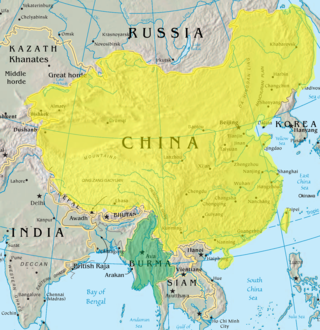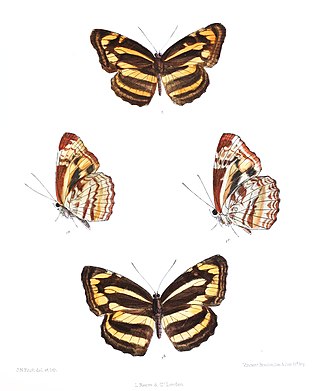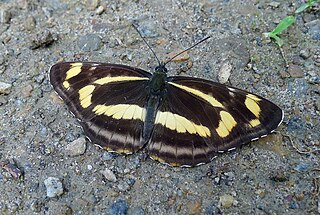
Yunnan is an inland province in Southwestern China. The province spans approximately 394,000 km2 (152,000 sq mi) and has a population of 48.3 million. The capital of the province is Kunming. The province borders the Chinese provinces of Guizhou, Sichuan, autonomous regions of Guangxi and Tibet, as well as Southeast Asian countries Vietnam, Laos, and Myanmar. Yunnan is China's fourth least developed province based on disposable income per capita in 2014.

Cymbopogon, also known as lemongrass, barbed wire grass, silky heads, oily heads, Cochin grass, Malabar grass, citronella grass or fever grass, is a genus of Asian, African, Australian, and tropical island plants in the grass family. Some species are commonly cultivated as culinary and medicinal herbs because of their scent, resembling that of lemons . The name cymbopogon derives from the Greek words kymbe and pogon "which mean [that] in most species, the hairy spikelets project from boat-shaped spathes." Lemongrass and its oil are believed to possess therapeutic properties.

The Shan States (1885–1948) were a collection of minor Shan kingdoms called muang whose rulers bore the title saopha in British Burma. They were analogous to the princely states of British India.

Baoshan, historically also Yongchang, is a prefecture-level city in western Yunnan Province, People's Republic of China. Baoshan is the second-biggest metropolitan area in western Yunnan after Dali.
Panthays are Chinese Muslims in Myanmar. Panthays are one of the oldest groups of Muslims in Burma. The exact proportion of the Chinese Muslim group in the local Chinese population remains unknown due to a lack of data. However, they are concentrated particularly in the northern part of Myanmar, closer to Yunnan, China from where the Panthays historically originated. They particularly reside in the towns of Tangyan, Maymyo, Mogok, and Taunggyi in Mandalay and Shan State.

Battle of Northern Burma and Western Yunnan was the name of the Chinese campaign with their allies in the 1943–45 Burma Campaign. The campaign ended in an Allied victory.

Neptis is a large genus of butterflies of Old World tropics and subtropics. They are commonly called sailer butterflies or sailers, or more precisely typical sailers to distinguish them from the related blue sailer (Pseudoneptis).

Neptis harita, the Indian dingiest sailer, is a species of nymphalid butterfly found in north-eastern India, Peninsular Malaysia, northern Indochina, southern Yunnan and Sumatra. The species was first described by Frederic Moore in 1875.

The Chin Haw or Chin Ho, also known locally as Yunnanese, are Chinese people who migrated to Thailand via Myanmar or Laos. Most of them were originally from Yunnan, a southern province of China. They speak Southwestern Mandarin.

The Sino-Burmese War, also known as the Qing invasions of Burma or the Myanmar campaign of the Qing dynasty, was a war fought between the Qing dynasty of China and the Konbaung dynasty of Burma (Myanmar). China under the Qianlong Emperor launched four invasions of Burma between 1765 and 1769, which were considered one of his Ten Great Campaigns. Nonetheless, the war, which claimed the lives of over 70,000 Chinese soldiers and four commanders, is sometimes described as "the most disastrous frontier war that the Qing dynasty had ever waged", and one that "assured Burmese independence". Burma's successful defense laid the foundation for the present-day boundary between the two countries.

Neptis cartica, the plain sailer, is a species of nymphalid butterfly found in South Asia.

Neptis nashona, the less rich sailer, is a nymphalid butterfly found in Asia. The species was first described by Charles Swinhoe in 1896.

Neptis anjana, the rich sailer, is a species of nymphalid butterfly found in Asia.

Neptis radha, the great yellow sailer, is a species of nymphalid butterfly found in Asia.
Kathu is a Lolo-Burmese language of Balong (坝聋), Nanping Township (南屏镇), Guangnan County, Yunnan, China. The Kathu are locally known as the White Yi (白彝). Wu Zili (2004) estimates that Kathu has a total of more than 7,000 speakers in Guangnan County, as well as in Jinping County, Yunnan. Ethnologue mentions a possible presence in Guangxi Province.

Aldania is a butterfly genus of the Limenitidinae. The genus is confined to the temperate East Palearctic. Aldania is closely related to Neptis.
The traditional New Year in many South and Southeast Asian cultures is based on the sun's entry into the constellation Aries. In modern times, it is usually reckoned around 14 April.















